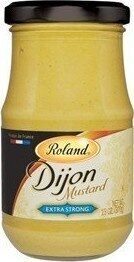Extra strong dijon mustard - Roland
This product page is not complete. You can help to complete it by editing it and adding more data from the photos we have, or by taking more photos using the app for Android or iPhone/iPad. Thank you!
×
Barcode: 0041224702783 (EAN / EAN-13) 041224702783 (UPC / UPC-A)
Brands: Roland
Categories: Condiments, Sauces, Mustards, Dijon mustards, Groceries
Countries where sold: United States
Matching with your preferences
Health
Ingredients
Food processing
Additives
Ingredients analysis
The analysis is based solely on the ingredients listed and does not take into account processing methods.
Serving size:
5 g (1 tsp)
⚠
️Serving size is too small (5 g / 5 ml or less) to calculate 100 g / 100 ml values and perform any further nutritional analysis
Environment
Carbon footprint
Packaging
Transportation
Report a problem
Data sources
Product added on by usda-ndb-import
Last edit of product page on by fer777.
Product page also edited by charlescool, clockwerx, kiliweb, yuka.sY2b0xO6T85zoF3NwEKvlmNNaIWOkC2VJx7vv0aCm-2VL8G3T8ktwoyqLKs.
If the data is incomplete or incorrect, you can complete or correct it by editing this page.






